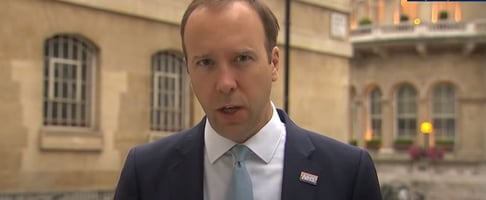It is always great when you lovely readers and our social media followers let us know about...
So, your public relations work has paid off, and you've got media interviews lined up.
Or you think your organisation will soon be in the media spotlight.
Media interviews give your organisation the chance to boost its credibility, be more visible, reach more customers with your key messages and build trust.
But to make the most of the opportunity a media interview presents - and navigate the rapidly evolving news landscape - you will need to be able to communicate with confidence and clarity.
A good media training course will help spokespeople communicate effectively with the media. And avoid the risks that can come with a poor performance.
But not all media training is created equally.
Why is media training important and what are its main benefits?
We're a media training company - we could talk extensively about why we think it is crucial.
So, let's tackle that question a different way.
Imagine you or your spokesperson have not had media training and you are suddenly in the media spotlight.
Could you remain calm and composed when faced with difficult questions from a reporter and prepare concise answers? Would you be able to stay focused and get your key messages and talking points across?
Could you create a natural-sounding conversation? Or would you sound like a corporate-speaking robot?
Sounds like a tall order, doesn't it?
Before we share the essential ingredients of a successful media training course, let's explore some training benefits in more detail.
We believe there are many benefits of media training for delegates and their organisation.
But if we had to pick just a few, we would highlight:
- Spokespeople who feel confident, prepared to face the media and able to tell your story
- Better understanding of the media landscape and what journalists look for and need
- The skills to handle tough questions and control interviews
- Improved communication skills, including knowing how to avoid jargon and the technical terms that can distract from key points
- Key messages that resonate with new and potential customers
- Improved media coverage and greater brand awareness
- Interview skills that transfer into other parts of working life, like public speaking and meetings
So, what are the essential components of effective media training?
Bespoke content
Every organisation is different and will have its own media training aims and requirements.
Some spokespeople will have plenty of media experience and want to build on initial training and sharpen their skills with mock interviews. On another course, the delegates could be new to the media.
So, a one-size-fits-all approach doesn't work for those wanting to make the most of their next interview.
An effective training course starts with the work carried out behind the scenes before the training day to ensure it meets aims, objectives and experience levels.
Realistic media interviews
There are many different types of interviews spokespeople can face - live television, radio, phone interviews for print publications, and remote broadcast interviews from the comfort of your home or office.
A media training course could take you through and prepare for all the main formats.
But is there much value in spending a large part of the course on a studio TV interview if that is an unlikely format for your company?
What media are you targeting? Who do you think would be interested in covering your organisation?
If you think you will have high-profile interviews on the horizon, then your course should focus on TV, national print and radio interviews.
But if your business wants to talk to trade publications, it makes sense to focus the training on the media skills needed to make the best use of that format.
Understanding what makes a story
You might think you have a good story, but is it likely to get media coverage?
Understanding why some stories gain extensive coverage while others are ignored can be a confusing and frustrating business.
Even the term ‘newsworthy’ can seem vague to those with little media appearance experience.
So, we spend time exploring the ingredients that capture a journalist's interest and result in a media outlet covering a story.
Crafting a compelling key message
For any media interview, you need a message that is clear and on brand.
Main messages or message? It sounds harsh, but the audience is unlikely to remember more than one major point you make. So, you should work out what you want your audience to go away remembering.
It will largely depend on your purpose. Do you want to persuade people of a message? Or do you want them to be motivated into action? Perhaps you are simply teaching them some new facts or skills.
Another important media training tip is that your key message should be capable of being spelt out in a single sentence of less than 20 words, otherwise, it is likely to be too complex for people to remember.
Telling stories
Storytelling is a crucial part of public relations.
And to connect with their audience, spokespeople must tell relatable stories in an interview.
A media training session should help spokespeople become more confident about sharing stories and anecdotes, and create a better understanding of how they support key messages.
Media trainers should also guide them through how and where to find stories and the language that brings them to life and speaks to people's hearts.
Difficult questions
One of the biggest worries people have about media interviews is remaining calm when faced with awkward questions.
An effective media training session will guide participants through how to anticipate questions.
And how to respond to those uncomfortable questions they would probably prefer not to answer given the choice.
This should include the bridging technique, not getting drawn into speculation, avoiding repeating the negative language used by journalists and how you can buy a little thinking time before you respond.
Expert trainers (who put the work in)
Our trainers are current working journalists from the UK's top newsrooms.
They know what makes a great interview and what spokespeople need to succeed in the media.
And just as they would for a real interview, they do their research ahead of the course.
They will pull together background information about your business, look at what your organisation has previously been in the news for, and explore what else is happening in your sector or industry. And it will help them prepare a line of questioning they will take on the day.
We believe this detailed research adds another layer of realism to the training our clients experience.
And have sector expertise
Most journalists are generalists. It means they have a working knowledge of most sectors.
But there are times when you will want to be put through your paces by a reporter with a detailed understanding of your sector, its issues and vulnerabilities.
It is particularly true if you are preparing your spokespeople for trade interviews, where they are more likely to meet journalists with in-depth knowledge of your sector.
Journalist tutors with extensive experience covering your sector will ensure your spokespeople get the most out of their training.
Practical
Media training should not just be about theory.
We believe people apply their knowledge best when they take an active role in their learning, receive immediate constructive feedback and have fun.
So, we pack our media training courses with realistic mock interviews where spokespeople can put what they learn to the test, practice their new skills, try to stay calm when faced with tricky questions, and start to feel comfortable and confident ahead of future media appearances.
Ratio
As we just said, media training should be hands-on and involve many opportunities to build confidence and practice skills.
So, a course needs the right balance between the training team and delegates. Otherwise, your participants may find they spend much of the course watching others being interviewed.
There are advantages to watching your colleagues trying to communicate under pressure from a reporter.
But nothing beats having the chance to practice being a spokesperson and answer questions from a journalist yourself.
It is why our courses work on a ratio of one media trainer to three participants.
Body Language
It is not just what you say in media interviews, but also how you say it.
Things like facial expressions and being able to maintain eye contact can impact how spokespeople are perceived.
Swaying and fidgeting can make you seem nervous. Looking too relaxed can create the impression you don't care.
So, it is crucial media training helps delegates better understand the impact of non-verbal communication and good body language.
Post course feedback
Learning is an ongoing process and should not stop at the end of a training course.
There is a lot to take in during a full day of training.
So, it is vital training providers follow up courses with detailed tutor feedback and media training tips that can be viewed alongside course interview recordings.
The feedback also serves as a brilliant knowledge refresher ahead of future interviews.
Confidentiality
Perhaps not one of the more exciting ingredients, but this should not be overlooked.
If you want to prepare your spokespeople to practice answers to questions on sensitive issues you do not want to appear in the media or discuss the launch of a product which cannot yet be discussed publicly, for example, you need to know your training session takes place in a safe environment.
A good media training company will offer a confidentiality agreement covering tutors, technicians and anyone else who may work on the course.
How can you find the best media training for your organisation?
There are plenty of media training providers.
A good media training course will include the 13 elements we have just outlined.
But there are a few additional things to look out for:
Endorsements
If you think you may have found a potential media training company, it’s worth finding out what others make of their service before you commit.
Why not ask to speak with some of their clients?
Active on social media?
Social media is an excellent place to check that you approve of their thinking and it aligns with your business. Does the advice they issue look professional and well thought out?
A regular media training blog will be a great help once the course has taken place, giving your delegates the chance to follow up on their learning with ongoing media training tips and advice.
Media interview studio experience?
Appearing on television or radio can be a hugely daunting experience.
There’s nothing in your normal working life which prepares you for it, regardless of whether you are appearing in a studio or taking part in an outside broadcast.
If your spokespeople are likely to face a studio interview, you need a media training course offering mock interview experience in that environment. It will help ensure they feel able to communicate talking points with clarity, consistency and confidence under pressure.
Media First are media and communications training specialists with over 35 years of experience. We have a team of trainers, each with decades of experience working as journalists, presenters, communications coaches and media trainers.
Click here to find out more about our media training.
Subscribe here to be among the first to receive our blogs.




